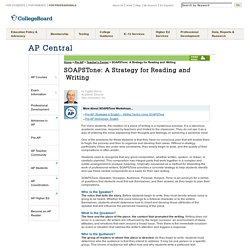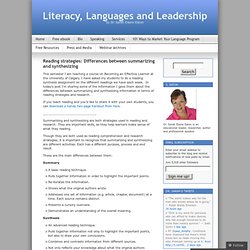

Plot and main idea/details poster. Reading Lessons: 12 Ways to Scaffold Texts for Students. Would you dump a load of building supplies on a lot and tell a random person to "build a house"?

Hopefully not! For the same reason, it is unwise to deposit an academic novel and some study guide questions on a student’s desk and say, “read it.” Student readers, like builders, need a foundation and a blueprint to be successful. Getting students to read academic novels can be difficult. Students usually lack interest in “school” books for three reasons: 1. they lack prior knowledge to support their comprehension,2. they don’t know the words on the page and3. they don’t understand the format of the particular genre. If we are going to really teach, and not just assign, we have to do some prep work. Let’s face it, interested readers are better readers.Students of all levels need some scaffolding; they need a plan and some knowledge in order to build a foundation for deeper understanding.
According to the National Council of Teachers of Mathematics, educators should... Research Before Reading. SOAPSTone: A Strategy for Reading and Writing. For many students, the creation of a piece of writing is a mysterious process.

It is a laborious, academic exercise, required by teachers and limited to the classroom. They do not see it as a way of ordering the mind, explaining their thoughts and feelings, or achieving a personal voice. One of the problems for these students is that they have no conscious plan that will enable them to begin the process and then to organize and develop their ideas. Without a strategy, particularly if they are under time constraints, they simply begin to write, and the quality of their compositions is often erratic. Students need to recognize that any good composition, whether written, spoken, or drawn, is carefully planned.
SOAPSTone (Speaker, Occasion, Audience, Purpose, Subject, Tone) is an acronym for a series of questions that students must first ask themselves, and then answer, as they begin to plan their compositions. Who is the Speaker? What is the Occasion? Who is the Audience? What is the Purpose? Summerize vs Synthesize. This semester I am teaching a course on Becoming an Effective Learner at the University of Calgary.

I have asked my students to do a reading synthesis assignment on the different readings we have each week. In today’s post I’m sharing some of the information I gave them about the differences between summarizing and synthesizing information in terms of reading strategies and research. If you teach reading and you’d like to share it with your own students, you can download a handy two-page handout from here. Summarizing and synthesizing are both strategies used in reading and research.
They are important skills, as they help learners make sense of what they reading. Though they are both used as reading comprehension and research strategies, it is important to recognize that summarizing and synthesizing are different activities. These are the main differences between them: Summary Synthesis Here are some helpful resources: Comprehension Strategy – Synthesis / Summarization / What it means to. Reading Strategies.